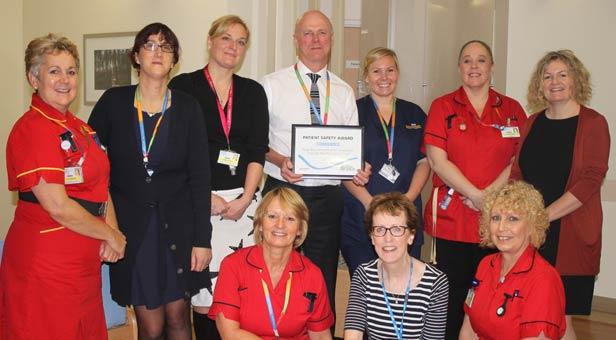
The RBCH Quality Improvement Team with their Health Business Award for patient safety.
Back row (from l-r) Head of nursing Kate Horsefield, Associate Lead of Clinical Governance and Risk Management Joanne Simms, Consultant Dr Scott, Medical Director Basil Fozard, Nurse Samantha Hornby-Wykes, matron Alison Pressage and Director of Improvement Deb Matthews.
Front row (from l-r) matron Sue Langlois, Improvement Programme Manager Geraldine Sweeney, matron Diane Potter.
A team of staff dedicated to patient safety at the Royal Bournemouth and Christchurch Hospitals NHS Foundation Trust (RBCH) has been commended at this year’s Health Business Awards.
The Health Business Awards are held annually by the magazine Health Business in London. This December, more than 80 NHS trusts, Clinical Commissioning Groups (CCGs) and ambulance services attended the awards, which are designed to recognise significant contributions made each year by organisations and individuals working for and with the NHS.
RBCH received a commendation at the awards following the implementation of a patient safety campaign called ‘Never get to Never’. The initiative was launched by the Trust in September this year to ensure the World Health Organisation (WHO) Safety Checklist is used by staff as a final cross-check of information every time a surgical procedure is performed, no matter how small.
Research has shown use of the WHO Safety Checklist reduces the margin for human error during invasive procedures and reduces the number of ‘never events’ that might occur at any hospital.
‘Never events’ are classified as events that should never happen in a hospital environment, and which cause significant harm to a patient, including performing surgery on the wrong patient or an instrument being retained post-operation.
Basil Fozard , Trust Medical Director and executive sponsor of the ‘Never get to Never’ campaign, said: “We are absolutely delighted to have been commended for the ‘Never get to Never’ patient safety campaign at the Health Business Awards this year.
“Patient safety is our Trust’s utmost priority, so we have to recognise human errors are a possibility so that we can discuss them, improve our practice, support our staff to work at their best, and ensure our patients are the safest they can possibly be.
“Research shows the WHO Safety Checklist dramatically reduces the margin for human error during a procedure, which is why we have made our hospitals ‘WHO Safety Checklist zones” he said.
To watch the Trust’s short film about using the WHO Safety Checklist, please visit: www.youtube.com/watch?v=vhlDmlxu0P4






